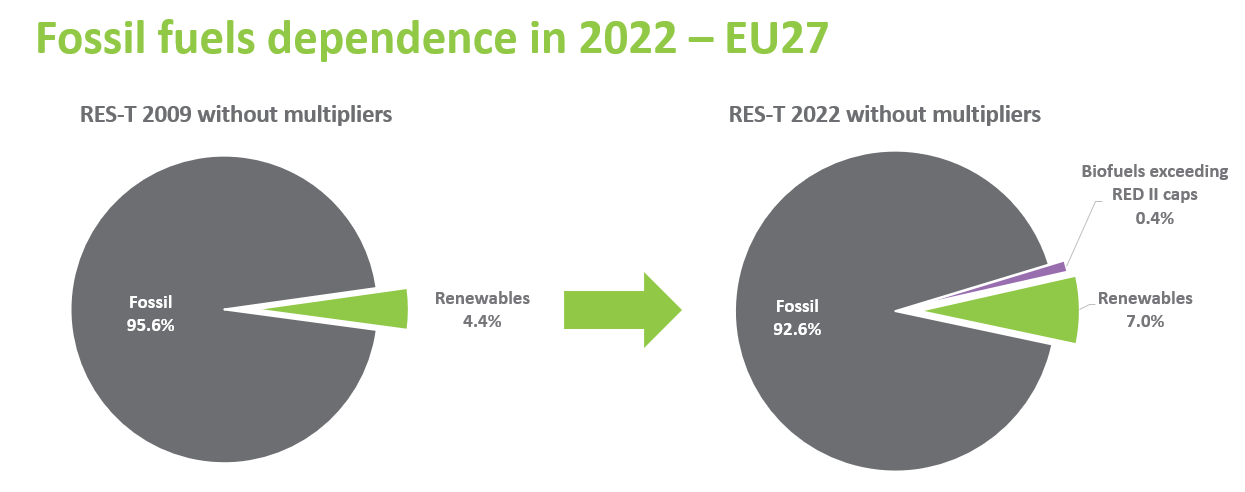New EU data once again show Europe needs to speed up progress on renewables by promoting uptake of biofuels
Despite progress in other sectors, the EU remains overly reliant on fossil fuels for transport and Member States are lagging behind in efforts to promote renewable energy sources such as sustainable biofuels, according to the most recent data on renewable energy use. The new figures confirm the need for a more pragmatic approach to meeting ambitious climate goals, one that includes crop-based biofuels.
According to updated figures from 2022 in Eurostat’s SHARES database, the EU is still struggling to curb its use of fossil fuels in transport. The data show that in 2022 the share of renewable energy in transport (RES-T) at EU-27 level was 9.6% including multipliers under RED II. That represents a 0.5% increase over 2021, but is still 0.6% lower than 2020.
These lower levels can be attributed to the impact of caps for biofuels implemented since 2021, but also to the recovery from the COVID-19 crisis which saw a strong increase in total transport energy consumption paired with a mild increase in renewable energy consumption. In particular, an increase in the use of fossil energy in transport was recorded in 2022 and it was not matched by an equal growth in the uptake of biofuels or other renewable energies.
Importantly, a significant amount of the reported renewable energy consumption is still artificially inflated using multipliers for certain biofuels or renewable electricity – which give a misleading picture of progress towards climate goals. Although SHARES no longer reports the RES-T without multipliers, ePURE has calculated that the real RES-T for road and rail for EU-27 is just at 7.0% in 2022.
Without considering modifiers and biofuels caps, in 2022, only two EU Member States, Finland and Sweden, are above the 2020 target of 10% renewables in transport. While Finland and Sweden have already largely incorporated renewables in their transport energy mix, surpassing the 14% RED II target for 2030, most other MS have barely made any progress in this regard and show even lower actual RES-T than in previous years due to fossil fuels growing faster than renewable energies.
And the clock is ticking. The RES-T target set by the revised RED III is more than double that of the RED-II, requiring Member States to achieve 29% RES-T by 2030. Consequently, the share of renewables in transport must be tripled between 2022 and 2030.
Accounted biofuels altogether accounted for 88.4% of renewables in transport, and crop-based biofuels still represent by far the largest share of renewables in transport with 48.4%. Yet EU policies continue to try to marglinalise or diminish this contribution. On-road renewable electricity only represents 0.1% of energy in transport – meaning the EU is a long way from being able to fulfil its RES-T targets with just electric vehicles.
For many EU countries, boosting renewables in transport could be achieved now by adopting E10, containing up to 10% renewable ethanol, as a standard petrol grade. Higher ethanol blends, such as E20 and E85, could also play a role.
The choice is clear: do we want real renewables such as sustainable biofuels that actually contribute to the fight against climate change, or artificial renewables – multipliers that exist only on paper and do nothing to reduce emissions?
The way forward should be clear to policymakers. Crop-based biofuels such as renewable ethanol are the most immediate, cost-effective, sustainable and socially inclusive emissions-reduction solution the EU has. Unleashing their potential should be a paramount goal if Europe truly wants to deliver on its 2030 objectives and beyond.

